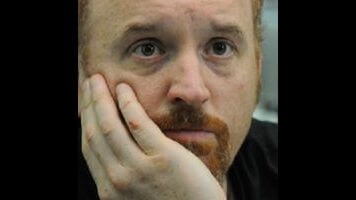Louie: "Pregnant"

The debut of Louie’s second season ends with Louis CK in his natural habitat on stage delivering a rant that eloquently summarizes the dominant theme of the show and the episode and has the added benefit of being funny and profound when he confesses, “Any parent who is honest will tell you, you live with that ambivalence. You look at the face of your beautiful, lovely child and you think two things at the exact same time: ‘I love this kid so much that it ‘s changed my whole life. I love other people more because of how much I love her. I love people that died years ago more. My love has traveled time because of how completely I love her and she loves me back. She’s completely given value to life that didn’t exist before and I regret every decision that led to her birth’. That’s how it feels.”
The raw, cathartic, strangely liberating closer serves as a perfect bookend to an opener that similarly wrestles with the profound ambivalence endemic in parenthood, especially single parenthood. In it, CK is lovingly and carefully brushing his adorable little girl’s teeth when she guilelessly enthuses, “I like mama’s better. I like mama’s better because she makes good food and I love her more so I like being there more.”
The actress playing CK’s daughter does not deliver the words with malice. In her mind, she’s merely stating her preferences, not accidentally feeding every single parent’s worst fears. She’s even intuitive enough to see the subtle look of hurt, rejection and disappointment on her father’s place and add the caveat that she enjoys spending time at his place as well; it’s just that enjoys spending time with her mother more because she has better mastered the technical aspects of parenting in way CK hasn’t.
CK is deeply hurt if not completely devastated. As is sometimes the case in Louie it’s not entirely clear whether what we’re watching is an objective account of an actual conversation between our tortured hero and his daughter or a subjective dramatization of his worst fears. The sequence has the perfect capper: after lovingly sending his daughter away, he flips her the bird behind her back. It’s an aggressive gesture, sure, but also a purposefully pointless one, since CK’s daughter is never going to see him flipping her off. CK’s daughter wounds him accidentally. It’s up to him as the parent to be the bigger man, but he can’t resist making one pointless passive-aggressive gesture of defiance. He’s a dad, after all, not a saint.
With that opening scene, Louie once again quietly lays down the gauntlet. It’s letting us know that Louie is going to deal with parenthood and children like no television before. The tenderness in the opening scene gives it its bite: if CK’s daughter uttered her words in anger or to hurt her father they wouldn’t have anywhere near the impact they do, just as if CK responded with rage or indignation the final gesture would have felt shrill and obnoxious instead of guiltily satisfying.
After maybe my favorite opening credit sequence of any show on television (who has a better opening credit sequence and/or theme song?), Louie explores one of its pet themes: the impossibility of trying to employ logic and reason when talking to children who are by definition irrational and ruled by urges and hungers.
In explaining why his daughter can’t have a treat her sister received, CK waxes metaphoric and attempts to say, “The only time you should look in your neighbor’s bowl is to make sure that they have enough.” He’s trying to sound wise and profound. He’s trying to act the role of dad and deliver the sort of bromides a father should. But the words and ideas come stumbling out of his mouth because he’s not that guy and his daughter is either too bored or too confused to either pay attention or process what she’s saying. Ultimately he gives up; it’s easier to concede defeat than impart values to kids whose brains are programmed to scream “me, me, me, me, me, me!” on a perpetual loop.
When CK’s pregnant, overweight, foul-mouthed and unmistakably middle-aged sister shows up and she praises her brother for being a real father, he modestly accepts her praise before acknowledging, “There are times when I wish they weren’t alive” with no anger in his voice. He’s not being mean. just honest. And we’re not used to seeing TV shows or movies about children or parenting or single parenthood that are as honest as Louie is.






























![Rob Reiner's son booked for murder amid homicide investigation [Updated]](https://img.pastemagazine.com/wp-content/avuploads/2025/12/15131025/MixCollage-15-Dec-2025-01-10-PM-9121.jpg)









